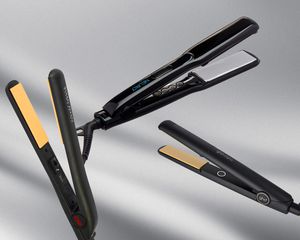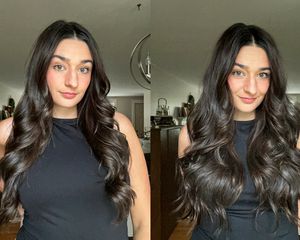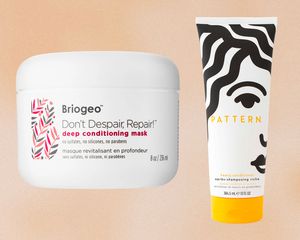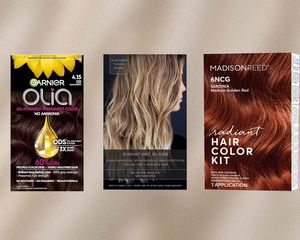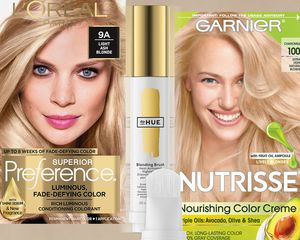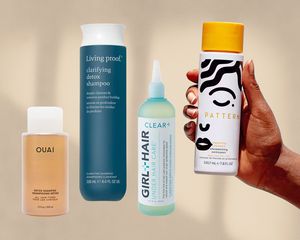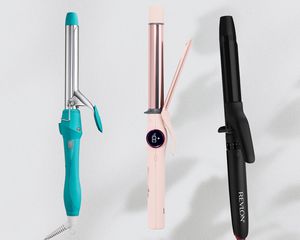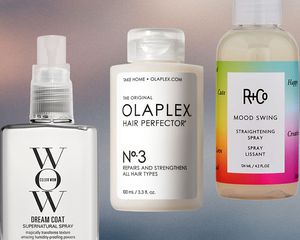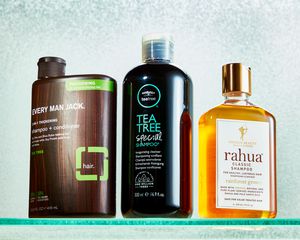:max_bytes(150000):strip_icc()/Aloe-Vera-for-Hair-822-2x3-hires-7e8f8cfc77ca4637b53ae8d8a32a634b.jpg)
Liz deSousa for Byrdie
Aloe vera has been used for centuries as a remedy to soothe burns, dry skin, and as an ingredient in beauty products. Many naturals across digital platforms tout aloe as a tool to keep natural hair supple, hydrated, and shiny. With their guidance, I went to Amazon and purchased a top-rated brand of aloe vera, mixed it with a quarter of water, and sprayed the concoction on my curls and scalp after washing and conditioning. To my delight, I found that Whitney White and other YouTube gurus were one hundred percent right to recommend using aloe on natural hair. My curls were hydrated, defined, and my scalp felt better than it had in months. A natural, affordable ingredient that mimics (or even rivals) more expensive treatments? Sign me up. But to make sure this wasn't too good to be true, I reached out to cosmetic chemist Tonya Lane for her thoughts on using aloe vera consistently in your hair.
Meet the Expert
- Tonya Lane is a North Carolina-based cosmetic chemist with a Master's of Science in chemistry from North Carolina Central University.
Aloe Vera
Type of ingredient: Hydrator
Main benefits: Soothes itchy scalp, prevents hair loss, and hydrates the strand
Who should use it: In general, people who suffer from dry scalp and people who are concerned about maintaining their hair's moisture level
How often can you use it: Once on wash day as well as a daily moisturizer to wake up and moisturize the hair
Works well with: Other water-based ingredients like glycerin and water
What is Aloe Vera?
Most of us know that the clear gel from the aloe plant soothes, but what makes aloe vera such a versatile ingredient for hair? "Aloe is a plant with multiple benefits for the body, skin, and of course, our hair," says Lane. "Naturally, aloe has the ability to hold moisture, especially in dryer climates where water is scarce. This awesome property makes aloe the perfect candidate for obtaining and retaining moisture in our hair." Lane also adds that aloe contains tons of vitamins, amino acids, and minerals for our hair, however, the main composition of aloe is water, and among its watery makeup, there are super cool chemical compounds called "polysaccharides."
Polysaccharides
Long-chain sugar molecules that contain hydroxy groups (-OH) which create a hydrophilic (water-loving) environment. This helps reduce transepidermal water loss, protecting the cell barrier function.
Aloe is especially powerful in terms of hydration in that it both locks and loads; it may host a moisture-retaining film on the hair, to help lock in moisture while still being able to attract moisture from the air due to its humectant properties.
Benefits of Aloe for Hair
:max_bytes(150000):strip_icc()/Aloe-Vera-for-Hair-862-1x1-hires-5476842482794eee834908ae350a7f2a.jpg)
Aside from drawing in and harboring moisture in the hair, many naturals credit aloe with promoting healthy hair growth. However, while aloe doesn't actually help the hair grow, it contains vitamin E and vitamin C, both of which help to protect against free-radical damage, meaning the integrity and strength of your hair may be better maintained.
Aloe is also quite soothing due to its hydrating nature and anti-inflammatory properties, which make it an integral ingredient for those with itchy scalps and dandruff.
Side Effects of Aloe Vera
There's usually little cause for concern when using aloe vera gel, but some people may be allergic to it. Before using aloe vera topically, do a patch test. Rub a small amount of aloe vera on the inside of your wrist and wait up a couple of hours to see if your skin reacts. This test will let you know if you have an aloe sensitivity.
Though side effects are not common, aloe can leave a film on the hair. Testing out different product layering can help you figure out what works well with the water-rich plant.
How to Use It
:max_bytes(150000):strip_icc()/GettyImages-1355146675-c607fac9fa76482c969d1471f050b56d.jpg)
Iryna Veklich / Getty Images
Lane explains that "Due to the hydrophilic (water-attracting) makeup of aloe, it works well with other water-based ingredients like glycerin and water, rather than an oil. You can still add a tablespoon or two of aloe vera juice to your favorite conditioner or moisturizer for extra moisturizing benefits." If you're planning to use it as a daily moisturizer, Lane recommends this formula for your spray bottle:
- 1 cup of water
- 1/2 cup aloe vera juice (inner fillet)
One final note Lane adds is that there can be too much of a good thing—even moisture. After using the above spray in large doses, Lane says her hair "became too moisturized, and [she] had to get a protein treatment to revive [her] hair." In other words, apply sparingly and only when your hair really feels like it could use some extra love.
The Best Products With Aloe
When looking for aloe-based products to adds to your hair routine, Lane recommends taking a look at the ingredients list first. "Unless aloe vera juice is in the first five ingredients of a product, it's most likely in the formula at very small amounts. I recommend buying aloe vera juice from your local health food store. My favorite is Lily of the Desert Inner Fillet Aloe Vera Juice."
With Lane's advice in mind, we rounded up seven products that are fan favorites and have aloe within the first five ingredients.
Adding aloe to your hair care regimen can be as simple as finding a product to infuse into your conditioners, leave-ins, and shampoos. I can vouch for this cold-pressed organic aloe, as it has been a game-changer in my wash day routine.
How you start your wash day is vital to the end result, and Anita Grant's aloe-based, sulfate-free blend is pH balanced. The shampoo will hydrate, ease frizz, and soothe the scalp without disrupting your hair's natural oils.
Made with glycerin, biotin, and aloe vera, this moisture-rich formula is ideal for maintaining your scalp and hair while promoting hair growth. Reviewers agree that the nozzle design of the bottle makes application simple and direct to avoid wasting product.
The Innersence Beauty brand is a favorite among many curly stylists due to its high quality nourishing ingredients. With aloe vera, shea butter, flaxseed, and monoi oil in this creamy conditioner, your coils will be the perfect canvas for your styling products.
We're a huge fan of gels because they define and moisturize depending on what type of gel you're using. Anita Grant's plant-based gel can help elongate and define curls while sealing in moisture without a flakey cast.
If you haven't experimented with aloe yet, it's worth a try. Finding a high-quality product is relatively inexpensive, and in the event that it doesn't work for you, you can always use it on your body because aloe vera has a wealth of benefits beyond hair.

